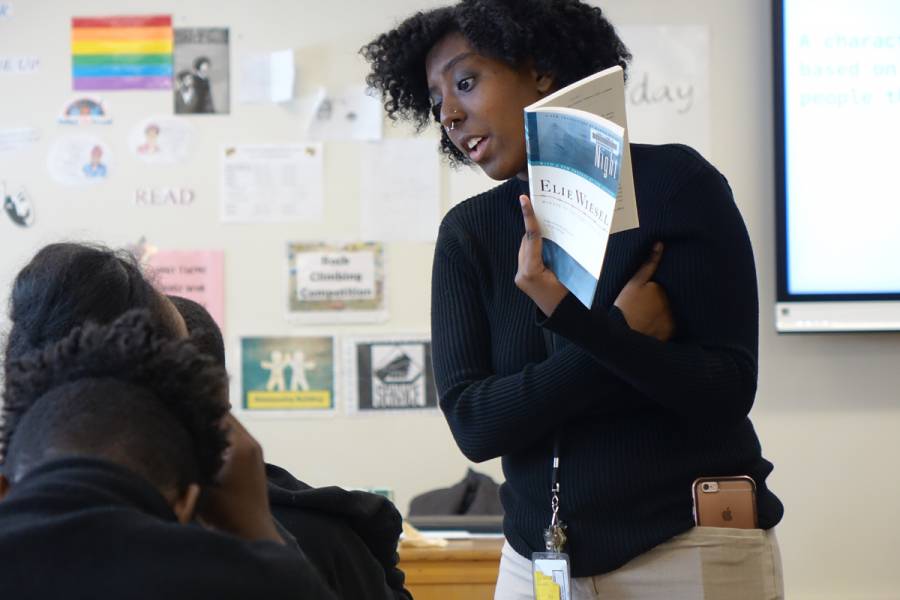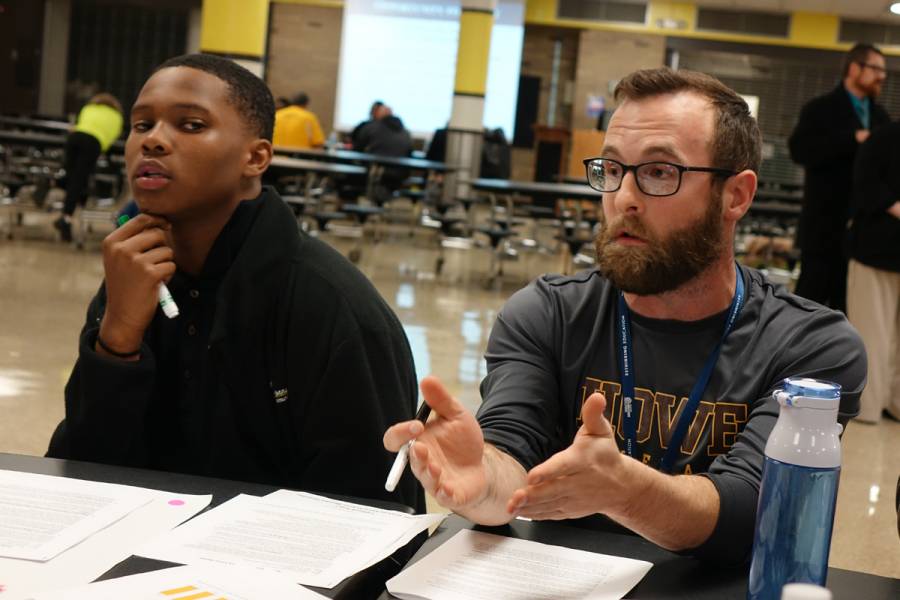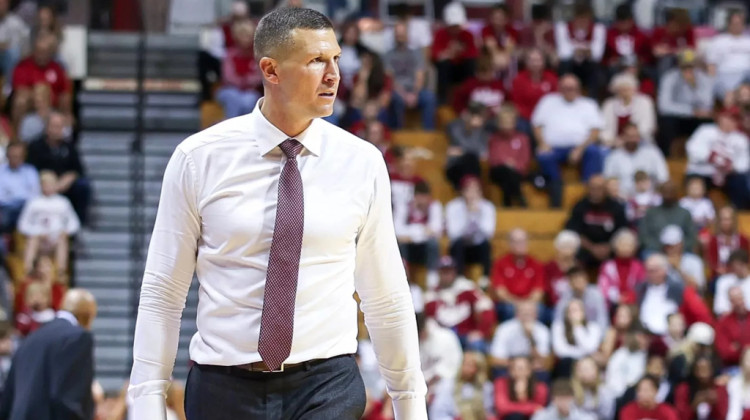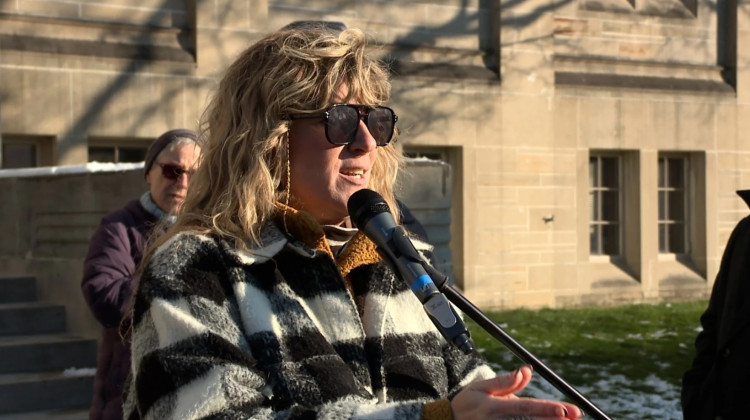This is part of The Takeover, a WFYI News series about the promise of school turnaround and the effects of the 2011 state takeover of chronically failing schools in Indiana. The Takeover audio documentary airs 7 p.m. Monday, Feb. 25 on 90.1 WFYI.
Lloyd Knight had a simple message when he walked onto the Howe Community High School auditorium stage the first day of the 2017-18 school year.
“We love you,” the new 6-foot-5 principal said in a gentle tone.
Muffled laughter and groans came from some of the several hundred students and staff in response.
Ernest Tucker, a coach and staffer, remembers. “Being a public school, a city school, everyone lookin’ like ‘love?'” he said. “So everyone busts out laughing. All the kids: ‘Love? This guy is not going to make it.’”
It was also uncertain if the school was going to make it.
The Near Eastside school, on the edge of Irvington, had been graded an academic failure by the state for a dozen years. It was entering the sixth year of state-takeover and managed by a private company. Enrollment and graduation rates were at an all-time low. More than a hundred teachers and staffers cycled through the classrooms in the past few years. A few didn’t even finish a full day. Students often roamed the halls, and when staff directed them back to class, many found uneven discipline and unprepared teachers.
Then 35-year-old Knight was hired as a final attempt to turn the school around. The private company running the school, Charter Schools USA, brought him on in 2017 to be Howe’s fourth principal in six years.
On the first day of school, standing on the auditorium stage -- after he told the students he loved them -- Knight added, “I’m crazy -- straight up. There ain't nothing that I think we can’t do.”
“TC Howe is a wonderful school. And we are going to do everything it takes, everything, to make it the absolute best school it can possibly be for you. We are not doing it for us,” Knight said. “There was an opportunity for me to be here and I snatched it because, I’m going to say it again, I love you.”
No one laughed.
It’s now been 19 months since Knight took the reins at Howe. The State Board of Education will vote in March on whether the school should close or if Charter Schools USA can reopen it as a charter school free of state sanctions. And while the school’s future is still uncertain, there’s growing optimism it will have a rebirth.
Sweating The Small Stuff
Each day at Howe begins the same way. Around 600 students walk single-file into the school around 7:40 a.m. Knight is there to offer a fist bump and welcome to each one. Sometimes there’s a joke, a reminder or a tight arm around a student’s shoulder to get a whiff of what smokey imprint could be on their jacket.
“We try to make sure students get at least three greetings before the start of every academic day,” Knight says as students stream in on a chilly Monday morning in mid-January. “It’s mostly about acknowledgment -- you want every student to feel acknowledged before you educate them.”

The staff greets the students as they head to their lockers. They also keep an eye on the students’ clothes -- are they in uniform? -- and on their attitudes -- is someone having a bad morning?
Daniel Geeslin, a junior, says there’s no way a classmate could be in a foul mood and a teacher not take notice.
“Someone comes up to you and asks, ‘How are you doing?’ -- you are going to be happy and talk to them,” he says. “Everything is going to be alright."
Since Knight became principal, he says staff also have taken a much more active interest in each student’s academic well being.
“It’s just like a family,” he says.
This practice is new under Knight, one of his non-negotiables. He calls it “sweat the small stuff.”
That means students and teachers are expected to follow all the rules for the entire school day. These include wearing the correct Howe uniform, correctly, with your shirt tucked in. Cell phones and earbuds, of course, not allowed in class.

Students are also expected to carry a book, of their choosing, at all times. It’s common to see them gripping a dog-eared paperback in the hallway or reading in between activities in class. This practice, called “read like a scholar," is meant to reinforce reading comprehension. To encourage it, stacks from the school library line the hallways to make books easily available.
Some of these rules may seem like micro-issues for a school facing closure after more than a decade of academic failures, but Knight believes they are essential. Without them, he says school culture breaks down bit-by-bit.
“If you are not sweating the small stuff in the population of students we serve -- it is chaos,” Knight says. “If you do not acknowledge those students or giving them praise, they are going to find a way to get it. Whether you want it to or not.”
This year at Howe, all students qualify for free lunch, according to state data. Of students enrolled in the fall, 56 percent are black, 23 percent white and nearly 15 percent Hispanic.
To acknowledge students more, Knight introduced ClassDojo at Howe -- a classroom management app typically used in elementary schools -- to promote positive behaviors.
Students can earn positive points. Staff members award students for class interaction, helping each other, or staying calm during another student’s outburst. The positive points add up to incentives -- special snacks or freedom during lunch to watch television.
A student will also earn a negative point for disruptive behavior, being out of uniform or using foul language. Enough points can send students to a detention room, where they work on class assignments.
The system allows a classroom teacher to tap a smartphone a few times and quickly summon a behavior-focused staffer to remove the student.
By all accounts, this point-system is working. Geeslin, the junior who said the culture felt like family, says he’s seen a clear change in how students think before they act and encourage others to shape up.
“There’s the awareness that someone is watching you, and you get an incentive for doing the right thing,” he says.
Nearly 25,600 Dojo points were awarded for good behavior compared to 7,500 negative points for behavior that requires intervention. Expulsions are also down to one student for this and last academic year, compared to five in 2016-17.

But students aren’t the only ones expected to follow the rules.
Staff hall monitors periodically visit classrooms to spot issues a teacher may have overlooked. The monitor notes the discrepancy on a digital form, and a report goes to the main office.
One afternoon in late January, monitor Ernest Tucker began his daily checks. In a resource class, he spots a student wearing a jacket and, underneath is, not the required polo-type shirt. Tucker starts to tap his phone.
“Why should that count against me?,” the learning aid calls out at Tucker, saying the student just arrived in her room from another class.
“That an interesting question,” Tucker says as he keeps tapping with a large smile. “You should’ve double down and checked it.”
The aide, now upset, tells Tucker it’s just not fair he should make a report. Shouldn’t the shirt should have been flagged earlier in the day by someone else?
“Now you will start setting the precedent, they can’t come into the (classroom) unless they got the proper stuff,” Tucker says before walking back out into the hall.
Tucker and others who’ve worked at Howe for a few years now differentiate between “Old Howe” and “New Howe.”
Old Vs. New
“Old Howe” refers to the five years of state takeover between 2012-to-mid-2017 -- a period when unstable school leadership jolted the oversight of Howe students, and state and local politics were sometimes at odds with Charter Schools USA, a for-profit company.
“New Howe,” assistant vice principal Laci McKenzie says, started when Knight arrived. This was also around the time when CSUSA spun off the nonprofit company Noble Education Initiative to serve as a local team to support Howe, Manual and Donnan.
McKenzie taught science at Old Howe. In New Howe, she oversees school discipline and culture. She says there’s undoubtedly a different vibe in the building. She says students used to come into school with a chip on their shoulder.
“The way they talked and the way they walked and interacted with every adult was like they're getting ready for a battle,” she says. “And now, like they're so, they're so chill. I mean it's still an inner-city school, but it's just crazy -- you can see joy in their education.”

McKenzie says this vibe is a result of consistent expectations, including things as basic as always having a hall pass.
“A lot of people come into the inner city and they're like, ‘Well I'm clearly going to have to try something new no one else has ever tried, because it's failing,’” she says. “Wherein, one of the biggest problems in the inner city is the lack of consistency, like everyday the exact same thing. It's letting students know so they can know what's happening.
“So I think that there's too much ingenuity with people going into inner city.”
Lack of consistency, McKenzie says, also derailed teachers who didn’t have expectations of what each day would bring.
“People were coming in and pouring everything they had in these kids but they didn't have anything to pour back into themselves,” she says. “They would literally get burned out in a week.”
Knight is quick to point out, he didn’t introduce a ton of new concepts his first year but enforced the rules already set at Howe. It wasn’t a magic bullet, he says, just consistency. It’s also earned him a nickname -- “The king of simple ideas.”
“I told kids they couldn't curse anymore. So, for the most part, they stopped, right? I told students that we're going to expect them to learn every day,” Knight says. “We're going to supervise you every day. And when they saw those things happen, I think that had an impact.
"It's like: Are you willing to go to the furthest degree to hold stakeholders accountable for the education of our children in this building? And I think people feel that from me. I'm willing to do anything necessary to make sure that it gets right here."
But while many say Knight’s new approaches convince students and staff of their potential, he wasn't unanimously embraced from the start. Many teachers left last summer, at the end his first year.
“There were a lot of people who didn't seem to want to do what was necessary for students,” he says. “There were a lot of excuses made. And with this [current] group, I think there are less excuses because people understand that adult issues prevent us from doing what's best for kids -- I am not going to allow that to happen.”
To help ensure teachers stay at the school, Knight hires some educators from Teach For America, a transition-to-teaching program for recent college graduates. The two-year contract required for the program offers some reassurance the teachers will stay.
Failure First
Years before Howe, Knight graduated from Shaw University in Raleigh, North Carolina in 2006 and would soon land a self-described “cushy job” as an elementary teacher at Newport News Public Schools in Virginia. But Knight wanted to teach in inner city schools, and after a few years, he moved his family to Chicago.
Knight’s first job at a Chicago school lasted only a year. He was fired for his students' lack of academic improvement.
“I never failed to that degree before,” he says.
“And when I was a teacher I won all the time -- every year, every day. And then for the first time in my professional career, to fail? It was the first time I had to truly humble myself and say, ‘OK, I don't have all the answers.’”
The next job he took was with Florida-based Charter Schools USA, one of the country’s largest charter school companies. It was managing several Chicago schools at this time and hired Knight in 2012 to provide curriculum support.
A few years later, Knight became principal at the troubled Chicago International Charter School Lloyd Bond, a southside school managed by CSUSA. He led that school for two years and instituted intensive math and literacy programs that boosted the school off the city’s closure list to the fourth-highest rated elementary charter school in Chicago. After that, Knight moved to North Carolina to oversee CSUSA’s expansion there.
Back in Indianapolis, before Knight came on board, Howe High School continued its struggle. Its graduation rate dropped to 48 percent, and no students passed the ISTEP 10 during the 2016-17 school year.
Knight took the challenge of turning Howe around and moved from North Carolina to Irvington.
Soon after, the State Board of Education approved a three-year extension for CSUSA to operate Howe and Manual high schools, with a plan to vote on the schools’ future halfway through that period.
CSUSA promised the state board improvements before that vote. Knight, fresh in the new job, had a deadline to make significant progress.
An Academy For Every Student
A year and a half later, that vote on Howe’s progress is expected March 6. And many at the school are hopeful.
In the past year, Knight overhauled its academic approach and culture. It’s been a process of collaboration with assistant principals Paige Pittman and McKenzie, and, at times, convincing CSUSA it’s the right path.

One of the clearest examples of the overhaul is a program called Academies. Students may choose to spend the first two periods “doing what they love,” Knight says. They can take regular academic classes or select from a list of what would typically be after-school activities for credit: dance, student council, culinary, JROTC, sports, theatre and other subjects.
“Why wouldn't I want you to do the things that you care the most about as soon as you get here,” Knight says. “So that you can have an even easier time letting go whatever happened to you before you got here.”
Knight and school leaders say the changes, from operations to classroom instruction, are making a difference.
Here is some progress:
- The 2018 graduation rate is 91.8 percent -- the highest rate in more than a decade and nearly double the rate of the previous year. For the first time in memory, the senior class had no dropouts. The handful who did not graduate are listed as “still in school,” according to state data.
- Student growth on last year’s ISTEP was 119 points -- a significant increase from past years.
- Last month, Knight said all 25 students who retook the ISTEP 10, an exam required for graduation, passed. A year ago, all the student re-testers failed.
- Enrollment is increasing, compared with the past three years. The official fall enrollment is 577 -- almost 100 more than the previous year. An influx of students chose Howe, Knight says, in wake of IPS closing three high schools last summer
And there is more progress to make. Last year, just 19 percent of Howe students passed both math and English portion of the ISTEP. An increase from past years but far below the 50 percent state average, or even Indianapolis Public Schools’ 23 percent pass rate.
Howe High School remains an F on the state’s A-F scale for 13 consecutive years, according to state data.
But Knight is confident that trend will end when the next A-F accountability grade is issued late this year or early 2020.
“We are an F and we own our F as a school,” Knight says. “We need to have the time necessary to show you what we can really do, and that's why I always, when I go to community meetings, I invite people to come in, like walk through our building, see what we're doing, see our students and then ask yourself, ‘Does this feel like a school that needs to no longer be here?'”
If you took Knight up on his offer, you would see that the teacher’s lounge doubles as a sort-of academic war room. The entire back wall -- painted in large columns of red, yellow and green -- is covered in sticky notes. There’s a card for every student's details, including their current scores on math and English standards. Students are tested monthly on the standards.
“At any given time, I can look at a kid and say, ‘I know where they are on the wall,’ assistant principal Pittman says. “It’s important for everyone to do that because the more encouragement they get, the better. We can tailor instruction to it too.”

Students with scores that fall in the red column (“need two years of growth to pass”) or yellow column (“on the bubble of passing”) columns receive extra daily remediation -- a class called Success. This is a shortened daily class period where one standard is taught at a time. Each Howe teacher is required to be a “master” in a handful of standards to teach these classes.
Students in the green column are expected to pass the state exam. They attend the “enrichment” class and work on projects related to the standards they’ve mastered.
This practice is not revolutionary. The concept, and the data wall was brought in from consultant Pat Davenport and former Indianapolis-area superintendent Peggy Hinckley, who recently led Gary Community Schools has the state-hired emergency manager.
The difference, it seems, is Knight’s ability to rally teachers, staff and students around the concept and follow through on every detail. During a visit to the school last month, Davenport said, Howe embraced the improvement strategies more than other schools she's worked with.
Ahead Of The Vote
On March 6, the State Board of Education will effectively vote to end the takeover of Howe and Manual high schools by 2020. The third Indianapolis takeover school Emma Donnan Middle is on a path to become an “innovation school,” by operating as a K-8 school under CSUSA and be a part of Indianapolis Public Schools.
State law requires the board to choose one of the following options for each school -- close the school, merge it with another higher performing school, ask CSUSA to seek a charter with one of the state’s authorizers to keep control of the school, or return the school to the home district, IPS.
IPS leaders say they will close the schools if returned to the district.
The state board will weigh feedback and recommendations from a task force made up of IPS and CSUSA staff and community members. A consultant hired by the state board began holding meetings about the schools’ future last year.
Charter Schools USA wants all three to remain open as new charter schools. So far, the task force has found strong community backing for the company to do just that.
But some still question the feasibility of it all.
It’s unclear how CSUSA would operate these expansive buildings without extra financial support from the State Board of Education. CSUSA has received $20.7 million in federal funds, between 2012 and this year, to help manage the three schools in addition to state per-student funding, according to state data.
During community meetings about Howe’s future, questions about its viability were common. At one such meeting in Howe's cafeteria, Margaret Lawrence Banning, a longtime Irvington resident and executive director of the Irvington Development Organization, asked if there were even enough students to keep such a large school funded. In Indiana, the money follows the student, so low enrollment means less funding.
“It’s been on this failing trajectory, where most people who live in the immediate area, don’t send our kids here,” Banning says.
Students attended the meeting too. One asked, “Why is that?”
“It is not seen as a successful school,” Banning responded.

Knight knows he’s up against well-worn notions of what some believe Howe is.
The school, located in Christian Park and just west from Irvington, was already closed once, for five years. It reopened in 2000 as a middle school, later to expand to include grades 9-12, but some in the community had already moved on.
Then came the takeover in 2012. A law allowed the State Board of Education to take control of chronically failing schools rated "F" for six consecutive years, severe the school form its home district and turn them over to an outside manager.
“I'm sure there was never a time Howe it was like the movie Lean On Me where it's like graffiti all over the lockers and people are throwing computers out of a window in the middle of the day,” Knight says, referencing the 1989 biographical film of a tough-acting principal staring Morgan Freeman. “I don't think it was ever that bad. But if enough people say that something's not working, then you're going to have that perception.”
To change that perception, Knight has been on a sort of promotional campaign -- in person and on social media -- to change that view for a public unaware of what is happening inside the building.
So far, it seems to be paying off.
During a recent Irvington Community Council meeting, the members made a surprise show of support by voting to write a letter to the state backing CSUSA to retain control of Howe High School as a charter school.
Blake Johnson, the Indianapolis City-County Council member who represents Irvington and IndyHub president, was at the meeting. He praised Knight for reaching out to the community. That role, he said, was previously shouldered by alumni.
“I’ve not always felt that the school administration was in that position,” he said. “And quite frankly, I’ve never felt that CSUSA did a good job of engaging the community.
“I hope, regardless of the outcome … you are the principal of the school no matter what.”
The next day, Knight was still smiling about the council’s support. He wasn’t expecting it.
Graphic illustration by Judi Border/WFYI.
Contact WFYI education reporter Eric Weddle at eweddle@wfyi.org or call (317) 614-0470. Follow on Twitter: @ericweddle.
 DONATE
DONATE








 Support WFYI. We can't do it without you.
Support WFYI. We can't do it without you.